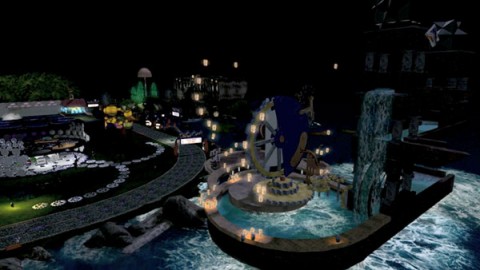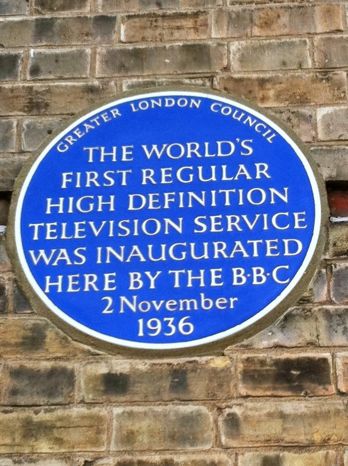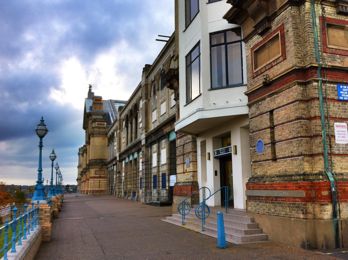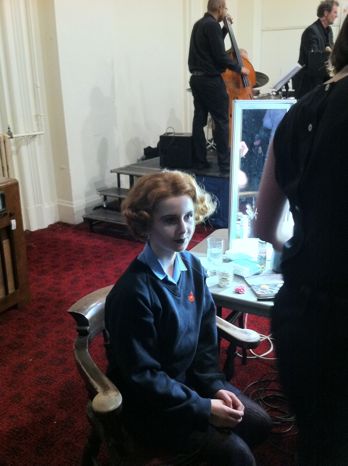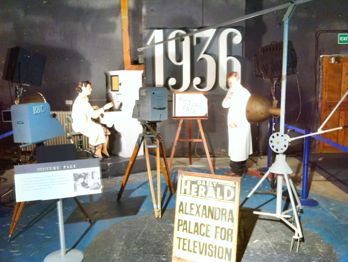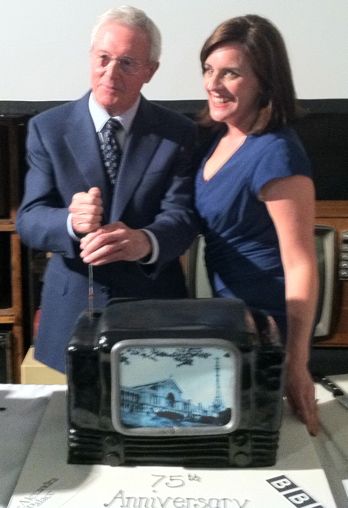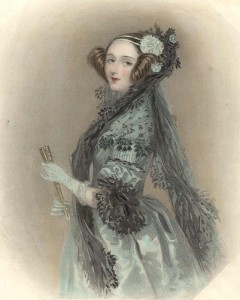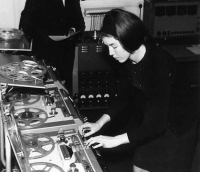Category — Broadcasting
Poetry at Relay for Life
I love Shakespeare, but I’ve never really thought of performing any.
However when we were preparing for the Relay For Life of Second Life Telethon, several members of the team were invited to record a series of poems to be played during the Luminaria ceremony (one of the most moving parts of the event).
The Luminaria Ceremony occurs at every Relay For Life event, whether in the organic world, or as in our case, in a virtual world. As the sun sets, luminaria lining the track light up the night. A hush falls over the crowd that had been overflowing with celebration. Participants, survivors, and caregivers then gather to remember loved ones lost to cancer and to honour those whose fight continues. The ceremony in Second Life included a wonderful additional feature: the releasing of illuminated Chinese lanterns into the night sky (see Beq’s picture above, taken in front of her amazing Escher build that you can just make out).
The official commentary is carried by T1 Radio, and they read a list of names, between which they play pieces of music. Now, they have a licence to play commercial records, but we don’t, so this year they kindly gave us a running order and timings and we were able to determine what was to go in the slots occupied by music in their coverage, so we could “opt out” to our own audio programming. This was the purpose of the pre-recorded poems. Members of our team put these recordings together with production music (mainly by Kevin MacLeod, see credit below) to create a series of really beautiful sequences, which I will hopefully be able to link to for you shortly where they’ll have full credits — they’re being assembled into a series of short videos accompanied by images of this year’s campsites.
One of the two pieces I chose to record was this speech from Prospero in The Tempest:
Our revels now are ended. These our actors,
As I foretold you, were all spirits, and
Are melted into air, into thin air;
And, like the baseless fabric of this vision,
The cloud-capped towers, the gorgeous palaces,
The solemn temples, the great globe itself,
Yea, all which it inherit, shall dissolve;
And, like this insubstantial pageant faded,
Leave not a rack behind. We are such stuff
As dreams are made on, and our little life
Is rounded with a sleep. (IV.i.148–158)
In addition to sending the voice-only recording off to the guys for incorporating in the sequence, I found a piece of music [Virtutes Instrumenti, Composed and performed by Kevin MacLeod (incompetech.com) Licensed under Creative Commons: By Attribution 3.0 http://creativecommons.org/
August 1, 2013 Comments Off on Poetry at Relay for Life
75 Years of BBC Television
Wednesday 2nd November saw the 75th anniversary of the opening of the BBC Television Service.
To commemorate the event, the BBC held a special celebration at Alexandra Palace, where the Service opened.
Originally, the intention was to hold a special Open Day on the 2nd, at which members of the public would be able to visit the studios and see audio-visual presentations. However this was eventually moved to November 5–6, leaving only an internal BBC event happening on the actual day.
I managed to obtain an invitation, for which my thanks to the ebullient Robert Seatter, head of BBC History, and technology journalist Bill Thompson.
The invitation said “3:45 for 4pm” and as a result I found myself in the Alexandra Palace Tower end car park well in time for the off, giving some time to take in the views over the city, experience the continual wind and enjoy some dramatic skies over this “Palace of the People” located at the highest point in North London.
When the BBC decided on Ally Pally as the site for the new BBC Television Service in the wake of the Selsdon Report in 1936, the place was already decaying somewhat. It’s a process that has continued since BBC Television left here several decades ago, and although the team now fronting the Trust that runs the site today is incredibly, and impressively, enthusiastic and upbeat, there is no way it can be other than an uphill struggle in these austere times. But you can’t say they aren’t trying hard and I wish them every success.
The BBC still maintains active offices in the block under the mast. But instead of entering through the doors there, adjacent to the GLC blue commemorative plaque on the wall, we were motioned into an entrance along to the left, up a metal ramp and into what had originally been the Transmitter Hall. It may be noted that this was probably not the first, but possibly the last, time that anyone had the bright idea of placing a pair of powerful VHF transmitters and a pigging great set of transmitting antennae right next to a set of television studios full of sensitive equipment.
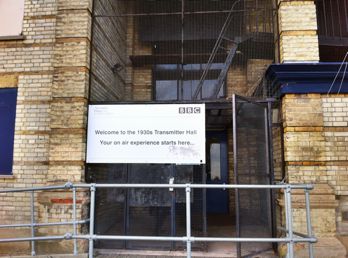 Inside, the room had been decorated with panels against the walls, each carrying information and images of some aspect of Ally Pally TV history, and a free-standing photo display of historical images, mainly provided by the Alexandra Palace Television Society. A jazz quartet played suitable 1930s style music; servers glided among the assembled invitees dispensing water, orange juice or Prosecco.
Inside, the room had been decorated with panels against the walls, each carrying information and images of some aspect of Ally Pally TV history, and a free-standing photo display of historical images, mainly provided by the Alexandra Palace Television Society. A jazz quartet played suitable 1930s style music; servers glided among the assembled invitees dispensing water, orange juice or Prosecco.
We had the chance to mingle and chat, and I was very pleased to meet TV cook Zena Skinner, who probably coined the phrase “Here’s one I made earlier” — though in her case she really had made it earlier, herself; I also met Professor Jean Seaton, the BBC’s Official Historian and Professor of Media History at the University of Westminster; and talked briefly to John Trenouth, Technology Adviser to the BBC Collection, whom I met during his time at what is now the National Media Museum in Bradford.
In the centre of the room, a make-up table and lights were set up, where various young women were being made up using the colours required by the Baird System.
When the BBC Television Service was established, the Government required two television systems to be used. On the one hand was the all-electronic Marconi-EMI system, which offered 405 lines, and on the other was the Baird electromechanical system which delivered 240-line television. Early on, it became evident that the Marconi-EMI system was significantly superior, but it had been Baird who had tirelessly promoted television as a concept, and lobbied the GPO over licensing and the Government to legislate for a Television Service. Baird highlighted the fact that his was a British invention – though it could equally legitimately be claimed that the Marconi-EMI system was British. Almost certainly the Government decision, a typical British compromise, was made at least in part to avoid suggestions that they were turning down a British innovation, the decision mandating the use of both systems on an alternating basis for six months before a choice was to be made before the two. The problems experienced with the technological dead-end of the Baird mechanical scanning system resulted in the decision — in favour of Marconi-EMI — to be made after just three months.
Baird Television actually used two systems. The fundamental feature of both was a “flying spot scanner” in which, almost completely counter-intuitively, the scene was scanned with a spot of light and photocells collected the light reflected from the subject. The “Spotlight Studio” used nothing more than this; the Intermediate Film Technique used a conventional film camera, exposed film from which was then passed immediately through developer and highly poisonous cyanide-based fixer (particularly nasty when it got loose), then scanned with a a flying spot actually under water. The flying spot scanner was very sensitive to red light, so if you were appearing in the Spotlight Studio, you needed the special make up: black lipstick, blue eye-shadow and a pale white face. Very neo-Goth. You checked it by looking through a red gel.
This was the make-up that was being applied to the young ladies at Ally Pally on the 2nd. Apparently the idea had originally been that BBC London would be sending a crew up to cover the party, but they had pulled out and the job was left to an enthusiastic team from BBC News School Report.
Meanwhile, we were treated to welcoming presentations: by the PR gentleman from the AP team, and from Robert Seatter, who encouraged us to relinquish our glasses and proceed upstairs to Studio A.
There were two main studios at Ally Pally originally, one above the other. Studio A was the Marconi-EMI studio, while directly above it was the Baird studio, Studio B. You can’t go into B today, because it’s riddled with asbestos and things are likely to fall on your head. But Studio A is accessible. At one end of the room is a tableau representing the production of the magazine programme Picture Page, which ran from 1936–39 and 1946–52 and was initially presented by Joan Miller.
Around the room are assembled old TV sets, and various exhibits in the room itself included an EMItron camera, which John Trenouth of the National Media Museum in Bradford kindly removed the lid of so we could have a look at the innards (sans tube).
In Studio A we were treated to a couple of brief audio-visual presentations, the first assembled mainly from clips from the film documentary Television Comes To London, which was made to tell the BBC Television Service story in 1936. Rebecca Kane, the MD of Alexandra Palace Trading Ltd, introduced Michael Aspel, a newsreader at AP during the period when BBC Television News was based here, to cut the cake.
And what a cake it was: made in the form of an old bakelite television with a picture of Alexandra Palace on the screen, deliciously thick icing and succulent innards. Very nice.
After that, we all wandered around Studio A and chatted to each other. I got into an amusing discussion about the way in which the Television Service closed down at the start of the Second World War, on September 1st, 1939 – about which a number of myths have arisen, most of which are incorrect (including the perpetuation of the main myth in Alan Yentob’s Imagine documentary, re-shown on Wednesday) – see The Edit that Rewrote History on the Transdiffusion Baird site, which includes a number of articles on television prior to 1955.
And then we gradually sloped off home.
See also:
The birth of television: the “Baird” microsite at Transdiffusion
75 years on from BBC television’s technology battle — a nice piece by John Trenouth
BBC Celebrates 75 Years of TV — Nick Higham visits Alexandra Palace
November 5, 2011 Comments Off on 75 Years of BBC Television
Queuing Theory and radio playlists
Here’s an interesting question. Well, it’s interesting to me, and maybe someone who knows about Queuing Theory can help me solve it.
Imagine you create a radio station playlist by selecting a number of albums (that meet a particular theme, say) and give you the total running time you want, and then you randomize the order of all the tracks on all the albums. A Rule setting in your playout system doesn’t let it play the same artist more frequently than once an hour (ie the “Minimum Artist Separation” is 60 minutes). If the system’s about to play a track that would break that rule, it moves it down the playlist until it doesn’t break the rule, recognising future appearances of the same artist (or it removes it an puts it back in the pool). If it can’t move the artist far enough away, it gives up and tell you that it can’t do it.
Is there a formula that will let you know for a given total running time of playlist (given an average number of tracks on an album, of average running time, and assuming each album is by one artist to keep it simple) how many different artists you will need to give you a high probability of the Rule never failing?
That’s the question: here’s the background.
If you decide to run a suitably licensed Internet Radio station, something you run into fairly quickly is a set of clauses in the Digital Millennium Copyright Act (DMCA), which define how often you can play pieces of music by the same artist and from the same album. In addition to appearing in the DMCA, and thus in the terms of the licensing arrangement with Sound Exchange in the USA, you’ll find similar clauses in the Phonographic Performance Limited (PPL) Webcasting licence in the UK.
Here’s how Live365 puts the requirement in their rules for broadcasters:
In any three-hour period:
- you should not intentionally program more than three songs (and not more than two songs in a row) from the same recording;
- you should not intentionally program more than four songs (and not more than three songs in a row) from the same recording artist or anthology/box set.
As far as I know, there are no playout systems out there that actually allow you to put these rules in and then makes sure you don’t break them. What we need is a set of check boxes:
Album separation: Maximum X songs from same album per Y hours. Max in a row: Z
Artist separation: Maximum A songs from same artist per B hours. Max in a row: C
Nobody currently does this. Why not? Any licensed internet station needs to follow rules of this type. Currently SAM Broadcaster comes closest, with the Playlist Rules dialog shown at the top of the page.
It’s more common to have something more simple. MegaSeg is a very nice Macintosh-based playout system – the one I use – and getting better all the time, but apart from its lack of official FLAC support (in common with SAM – but luckily with Megaseg there’s a workaround in the form of the Xiph Quicktime plugins), one of its few current failings (due to be addressed in the next release) is that the only setting that you can use to help meet the DMCA requirements is “Artist Separation”. So you can define the minimum length of time between plays of the same artist, and that’s it. Setting this value to 60 minutes will stop you breaking the second DMCA requirement, at least, although it’s a little crude: you have to rely on the fact that most albums are by one artist and manually select material accordingly to meet the album repetition rule.
Once you start trying to build playlists that don’t play an artist more than once an hour, you quickly discover that you need more artists than you thought. Hopefully it’s possible to build a formula to help you know how many artists you need, and about how many tracks by each.
Any ideas?
June 12, 2010 Comments Off on Queuing Theory and radio playlists
On Delia Derbyshire for Ada Lovelace Day
Today, March 24 2010, is Ada Lovelace Day, the day when we celebrate women in science and technology and their achievements – typically by blogging about them. You can find out more about Ada Lovelace Day at the Finding Ada web site, but here’s the basic gist:
Ada Lovelace Day was first celebrated in 2009, when over 2,000 people blogged about women in technology and science and the event receive wide media coverage. This year the hope is to get 3,072 people to do the same. Ada Lovelace Day is organised by Suw Charman-Anderson, who writes:
“Augusta Ada King, Countess of Lovelace was born on 10th December 1815, the only child of Lord Byron and his wife, Annabella. Born Augusta Ada Byron, but now known simply as Ada Lovelace, she wrote the world’s first computer programmes for the Analytical Engine, a general-purpose machine that Charles Babbage had invented.”
And there’s plenty more where that came from.
The marvellous logo shown above was created by Sydney Padua and Lorin O’Brien and appears on the former’s wonderful 2D Goggles comic web site.
Delia Derbyshire
I’ve been interested in electronic music for decades, and I suppose one of my greatest influences was the BBC Radiophonic Workshop, sadly disbanded in March 1998 during the era of the BBC “internal market” under Director-General John Birt, when departments had to operate at a profit or close. This resulted in absurdities like it becoming cheaper to nip down the street from Broadcasting House to HMV in Oxford Street to buy a CD containing a piece of music to use in a programme rather than obtaining the track via the BBC Record Library.
Delia Derbyshire (1937–2001) was born in Coventry, my home town, and completed a degree in mathematics and music at Girton College Cambridge. In 1959, she famously applied to Decca to work at their recording studios in Broadhurst Gardens, West Hampstead and was turned down, being told that they didn’t employ women.
After a stint with the UN in Geneva and with music publisher Boosey and Hawkes she joined the BBC Radiophonic Workshop in 1962, which, in those days before synthesisers and samplers, was mainly experimenting with musique concrète techniques, involving recording sounds from ordinary objects like rulers and lampshades and playing them back at different speeds backwards and forwards, editing them together into pieces of music. Below you can see Delia describing her work in this respect.
Most electronic music of the time was fairly abstract, but as the job of the Workshop was to provide incidental and theme music for BBC television and radio productions, their output tended to be a lot more melodic and accessible. Derbyshire is probably best known today for her realisation – which amounted to co-composition – of Ron Grainer’s theme for the Dr Who television series which launched in 1963. However one could argue that some of her other work was more significant in artistic terms, such as her music for Barry Bermange’s work on the BBC Third Programme. Overall she provided themes and incidental music for over 200 radio and television programmes in the eleven years she worked at the BBC.
She also worked on other projects outside the Workshop, including co-founding the Kaleidophon studio with David Vorhaus and fellow Workshop member Brian Hodgson. The best-known work by this group (known as White Noise) – their first – was the seminal popular electronic music album An Electric Storm (1968) released on Island Records. The trio also recorded material for the Standard Music production music library, Delia composing under the pen-name “Li De la Russe”.
Having been away from the music scene for many years, her interest was rekindled in the late 1990s and she was working on a new album when she passed away as a result of renal failure while recovering from breast cancer.
You can read a fuller account of Delia Derbyshire’s life and work in this Wikipedia article.
![]() Recently Mark Ayres, BBC Radiophonic Workshop Archivist, has been going through the collection of her material held at Manchester University. BBC Radio 4’s Archive On 4 series is presenting a programme on this work, Sculptress of Sound: The Lost Works of Delia Derbyshire, which goes out on Saturday 27 March 2010 at 20:00 GMT.
Recently Mark Ayres, BBC Radiophonic Workshop Archivist, has been going through the collection of her material held at Manchester University. BBC Radio 4’s Archive On 4 series is presenting a programme on this work, Sculptress of Sound: The Lost Works of Delia Derbyshire, which goes out on Saturday 27 March 2010 at 20:00 GMT.
March 24, 2010 Comments Off on On Delia Derbyshire for Ada Lovelace Day
Time to start work to save the BBC
The British Broadcasting Corporation is in my view the best broadcaster in the world, and today it’s under attack from commercial rivals and politicians (primarily in the Conservative Party) backed by those same rivals (notably members of the Murdoch family). The BBC, in response, is proposing its own cutbacks in services. It’s the thin end of the wedge.
Unfortunately, the current Director General, Mark Thompson, who got the job in the wake of the Gilligan débâcle, and his colleagues at the top of the Corporation, have historically seemed to lack a backbone as far as standing up to critics of the Corporation is concerned. Instead of fighting back, in fact, the BBC and the BBC Trust seem to be taking the view that when threatened, you should throw in the towel and do what the opposition demands, however contradictory, ill-advised or short-sighted. The likely result, it seems to me, is the emasculation of the Corporation and the degrading of a magnificent institution, the envy of the world.
In addition, offering to make cuts is the thin end of the wedge. Just as the skimming off of the licence fee to fund digital switchover provided a precedent for skimming for other purposes, so a decision to make voluntary (or involuntary) cuts provides a precedent for more cuts. We already know the Tories want to dismember the BBC, and this is just starting their dirty work for them.
The Murdoch family, conscious that the world of newspapers is changing dramatically, want to try and halt the tide of change rather than going with it and seeing what new innovations they can come up with. It’s rather like the record companies trying to hold back change by making their customer the enemy. Both will fail. However, the Murdochs may cause extensive collateral damage before they realise this, and nowhere is this of more concern to me than in the case of the BBC.
Thus it is that today the BBC Trust has published a Strategy Review for public consultation. It recommends closing BBC Radio 6 Music and the BBC Asian Network, reducing the content of the BBC Web Site — one of the most popular in the world — by 25%, and other measures. You can find the actual review itself here. You can also read the commentary of the BBC Chairman, Michael Lyons, on the review.
We licence payers have the ability to comment on the proposals, and I recommend that you do so. This can be done via an online survey which asks a series of questions based on the proposals.
If you are concerned as I am about the proposals, I also urge you to sign the petition at avaaz.org. Petitions have swayed the BBC in the past. There is also a petition at 38 Degrees.
I thought I would include here my answers to the questions posed in the Online Consultation questionnaire. I hope you find them of interest. I’ve also written some additional comments on the situation in the Transdiffusion MediaBlog.
BBC Strategy Review: My Response
The BBC’s strategic principles
Do you think these are the right principles?
The only thing I am concerned about is “Doing fewer things”. Why do fewer things? In particular the web site is a marvellous resource and worth every penny. The BBC should be doing unique things that nobody else can be bothered to do, and the web site is one such. Radio 6 Music is another.
The BBC needs to offer quality and originality, and the web site, Radio 6 Music and the Asian Network deliver these.
Should the BBC have any other strategic principles?
The fundamental Reithian principles of “Inform, Educate and Entertain” still work well in today’s environment. The BBC has a duty to deliver these to the public that pays for it. That means adopting new technologies and new delivery methods, and giving them the funding they need to do the job well.
The BBC is in a lose/lose situation in that if it produces popular programming, commercial rivals will moan that it stifles competition. If it produces high-quality and original programming that attracts relatively few viewers and listeners, people will say it’s wasting money.
Thus the BBC needs to unequivocally commit itself to quality and originality and make it clear that by making the programmes the commercial competitors will not make, it is bound to lose viewers and listeners, and that this is an inevitable consequence of such a strategy. Thus criticism of the size of viewing and listening audiences must be ruled as irrelevant and this must be made perfectly clear.
Proposed principle: Putting Quality First
Which BBC output do you think could be higher quality?
There are broad areas where a channel or station could offer “higher quality”, but primarily by dropping programming of a lowest common denominator nature. One could argue that general entertainment programming with very expensive celebrities, for example, or reality shows (were the BBC to consider doing them in the future), can be left to the commercial stations. That doesn’t mean that the output of the BBC in these areas is not of “high quality”, but that the types of programming themselves are not original or of high quality.
Offering you something special
Which areas should the BBC make more distinctive from other broadcasters and media?
Celebrity chat shows and reality TV are not distinctive. Anyone can do them.
Factual programming is a particular area where the BBC already is distinctive, and this can be improved by taking advantage of the fact, for example, that there are no commercial breaks, and thus no perceived need for incessant recaps. The audience can be treated as intelligent and given a well-paced story, without having to be reminded of past points all the time or taking three steps forward and two back on each subtopic.
The BBC Web site and its range of services is distinctive and unlike any other offering, with its broad spectrum of news, comment, information and blogs. This needs to be developed further and take full advantage of new technology.
Stations like Radio 6 music, Radio 3 and Radio 4 offer distinctive programming and music that cannot be heard elsewhere. Radio 3 is nothing like Classic FM, for example. There should be more specialist programming not less.
In general, the BBC is not being distinctive when it produces programming similar to that found on commercial stations and channels. The BBC’s strengths include factual and documentary programming, high quality modern and period drama, linking into new technology such as the web site and iPlayer, and music radio that escapes from the mainstream.
The Five Editorial Priorities
Do these priorities fit with your expectations of BBC TV, radio and online services?
Yes, they do.
Proposed principle: Doing fewer things and doing them better
We welcome your views on these areas.
Closing Radio 6 Music and the Asian Network are in direct conflict with the goal of “Offering something special”. While one might argue that ultimately there should be no need for an “Asian Network” as a separate entity, we are not there yet.
However in particular when considering Radio 6 Music, this kind of service — a service that a commercial broadcaster would not consider offering — is exactly the kind of thing the BBC should be doing and closing it runs contrary to previously-stated criteria.
In addition, radio is cheap — you could close BBC 3 and save a dozen specialist radio stations.
The BBC Web site is also fine as it is. I enjoy the breadth and depth of coverage, which is unmatched by other operators, not because the competition is stifled but because the competition simply cannot be bothered to do it this well.
I do not regard limiting the scope of the BBC web site as being in line with principles of excellence, originality or public service. We pay for the BBC and we have a right to the best possible service from it.
Arguably, nobody could do a web site better — it is one of the most popular in the entire world. Restricting its scope comes across as a knee-jerk response to criticism and not in line with stated strategic goals.
I would like to see BBC local radio remain locally generated as far as possible. There are plenty of people who would volunteer to produce and present locally-based programming outside drive time given access to BBC resources, for example.
I do not have particular views on other areas mentioned in this section.
Proposed principle: Guaranteeing access to BBC services
If you have particular views on how you expect BBC services to be available to you, please let us know.
I do not have any particular views on this section at present.
The BBC archive
Please tell us if you have views on this area.
The BBC is the greatest broadcaster in the world and it has a history of programming stretching back to the 1920s. In the past dreadful sacrifices have been made in the name of cost-effectiveness that have resulted in priceless coverage of international events, unique drama and other programming being irretrievably lost. Much of BBC coverage of the Apollo XI mission was taped over for example.
Maintaining a comprehensive BBC Archive is vital going forward and the mistakes of the past, resulting in irretrievable loss of our cultural heritage, must not be repeated in the future. We need to save the unique programming and output for ourselves and for future generations.
In addition to being archived, programming should be available to the public online and/or via viewing/listening environments like those offered by the BFI.
Proposed principle: Making the licence fee work harder
If you are concerned about the BBC’s value for money, please tell us why.
I have no specific views on this beyond suggesting that as far as salaries, expenses and similar areas of expenditure are concerned, I expect the Corporation always to be aware of cost and to negotiate the best possible deal. I expect contracts and expenses, for example, to be at levels generally regarded as standard in the industry.
Proposed principle: Setting new boundaries for the BBC
Do you think that the BBC should limit its activities in these areas?
No.
Just because your commercial competitors say you should or shouldn’t be doing something doesn’t mean that you should listen to them or that they are talking sense.
Closing 6 Music reduces the output of unique original programming and runs counter to other strategic goals. It also saves only a tiny bit of money in real terms.
Reducing purchases of overseas dramas is not a valid decision if you are intent on offering audiences the best. There are some areas of drama where no UK production can match the quality of programming made overseas, notably in the USA. Denying BBC viewers high quality content simply because it wasn’t made here is absurd.
Equally, there are areas where the BBC is second to none, and I am sure the Corporation does its best to sell these shows overseas and thus facilitate additional services without requiring an increase in the licence fee.
Reducing the scope of the BBC website makes no sense at all in terms of quality of service criteria. The web site as it stands offers a unique service that is unparalleled, not because competition is stifled but because nobody can be bothered to try. It is a unique service, just like, say, the Guardian’s online offerings. In different ways, I am happy to pay for both.
The BBC sets the standards here and in many other areas. Because the BBC had an original, brilliant idea doesn’t mean to say that they have to give it up because the commercial boys didn’t think of it themselves or see how they could make money from it.
I see no reason why the BBC should restrict or reduce its local offerings. Nobody else is going to do it, whatever they say. There is little or no money to be made there but there is a service that can be provided. Public service is part of the BBC’s remit. I do not have views on other proposals in this section.
Should any other areas be on this list?
I would seriously consider whether BBC 3 meets criteria for quality and originality. The few original programmes would be entirely appropriate on BBC 2 or perhaps BBC 4 for example.
My fundamental view is that there are no areas of service that the BBC provides that I am not happy to pay for. However if you are intent on making cuts, then closing BBC3 would save quite a number of radio stations.
March 2, 2010 Comments Off on Time to start work to save the BBC
& Simpson">“Only Remembered” — Coope Boyes & Simpson
In this video, leading British folk musicians Coope Boyes & Simpson provide the music in their unique and moving acapella style with the song “Only Remembered”, as we view aspects of the unique exhibition by the University of Oxford’s First World War Poetry Digital Archive in the immersive 3D virtual world of Second Life.
The exhibition simulates aspects of life in the trenches on the Western Front during the 1914–1918 war and presents work by the “War Poets” of the period.
As visitors explore the simulation, they can listen to the voices of veterans recounting their experiences of the war, view original film footage and photographs from the time, and learn about life on the Western Front, encountering some of the most powerful poetry in English literature by seeing the original manuscripts, turning the pages of the poets’ war diaries and letters, and listening to readings.
The video is taken from the 10 November 2009 episode of the TV series Designing Worlds, a weekly live show covering design and designers in virtual worlds, produced by Prim Perfect magazine and Treet.TV.
“Only Remembered” (Bonar/Sankey/Tams Voice Publishing) is used by permission and is taken from the album Private Peaceful The Concert (No Masters NMCD24) by Coope Boyes & Simpson.
For more information, read this article on The First World War Poetry Digital Archive in Second Life.
November 14, 2009 Comments Off on “Only Remembered” — Coope Boyes & Simpson
“Radio Drama At A Distance” OpenTech presentation
 On 4 July I was pleased to be able to give a presentation at OpenTech, held at the University of London Union, Malet St, on how to create radio drama when the participants are geographically separated. The technique employs VoIP technology (Skype in this case) and the presentation includes an overview of technology choices, how to get the best results, and planning, performance and production tips. Hopefully it will be useful to others interested in developing new approaches to the wonderful field of radio drama.
On 4 July I was pleased to be able to give a presentation at OpenTech, held at the University of London Union, Malet St, on how to create radio drama when the participants are geographically separated. The technique employs VoIP technology (Skype in this case) and the presentation includes an overview of technology choices, how to get the best results, and planning, performance and production tips. Hopefully it will be useful to others interested in developing new approaches to the wonderful field of radio drama.
The presentation is informed by my experiences working with the Radio Riel Players, a group based in the virtual world of Second Life around the radio station Radio Riel.
This presentation is now a Slidecast, including not only the slides but also the audio of my presentation, courtesy of Sam and David at OpenTech. Yes, there are some minor sync issues, but not disruptive ones!
For a more detailed description of the presentation, please see this page.
July 5, 2009 Comments Off on “Radio Drama At A Distance” OpenTech presentation
“Beeching-style” BBC enquiry? You must be joking
ITN newsreader Alastair Stewart calls for ‘Beeching’ inquiry into BBC — Guardian
ITN newscaster Alastair Stewart attacked the BBC at a CBI NW region dinner last night, suggesting that it would benefit from a “Beeching style enquiry” to assess whether its services are all really “necessary and viable”.
A “Beeching”-style enquiry into the BBC? You must be joking – look at the damage Beeching did that will hit us even harder as we enter the age of climate change. Taking the country’s major assets and willfully destroying them is not an answer to the question of why people aren’t watching the competition.
Calling for a “Beeching-style” enquiry is equivalent to calling for a hatchet job. In fact the suggestion is very revealing of true intent.
Only someone working for a competing media producer could think of such a thing. Go out and do a better job than the BBC and then you can talk from a position of strength instead of one of desperation. Make the investments in new technologies, innovative programming, stuff that isn’t dumbed-down to the lowest common denominator. Make some interesting programmes that are worth watching. And yes, cover the news better.
Everyone and their friend who still works on a newspaper wants to get at the BBC, but it is still doing a brilliant job. It just lost its nerve back in the days of the Hutton Enquiry. Yes, everyone has something to say about the licence fee — it’s the worst way of raising money for PSB except for all the others — but by not being a tax it is not so much able to be influenced by a government annoyed at criticism. We need ring-fenced funding for quality broadcasting to ensure it doesn’t all go the way of ITV — down to the bottom.
Yes, we also need other PSB providers, doing innovative things. We have at least one, in the shape of Channel 4 with its remarkable development initiatives like 4ip, but we need more. Is top-slicing the answer? No. Unfortunately there’s a precedent for that so no doubt we’ll see more, but at least keep it in the PSB arena.
We need a BBC that is free to make the programmes and deliver the services that commercial operators can’t, or won’t, provide. Look at the world-leading BBC web site; the world-leading BBC documentary and factual programming; the popular BBC News channel. These all offer amazing value at half the price of a daily newspaper and half the price of an average Sky subscription.
Of course there will be areas of the BBC that can be improved. I have no doubt that a bit of transparency would go a long way — a process already started. How about transparency on the commercial side? No doubt we would like the Corporation to pay less for celebrities — which is fine as long as everyone else does the same and it’s not in breach of contract. There’s room for improvement for sure — but a slash-and-burn dismemberment is not even slightly an answer.
Being unable or unwilling to compete is not a good reason for dissing the opposition. It sounds a lot too much like sour grapes.
July 3, 2009 Comments Off on “Beeching-style” BBC enquiry? You must be joking

